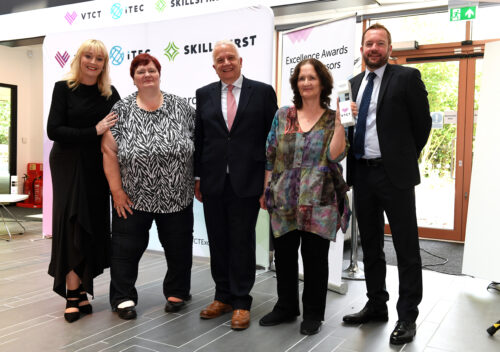 Q&A: Celebrating Greenhouse Therapies – VTCT Excellence Awards Small Training Provider of the Year
Q&A: Celebrating Greenhouse Therapies – VTCT Excellence Awards Small Training Provider of the Year
Winning the VTCT Excellence Awards Small Independent Provider of the Year is no small feat. It’s not just about being excellent; it’s also a testament to their strong commitment to supporting students and offering outstanding education.
This year’s winners, Greenhouse Therapies (GHT), hold a unique distinction as their learners themselves put forward their nomination for the VTCT Excellence Awards. The judges were deeply impressed by how GHT goes the extra mile to provide personalised support and ensure every student thrives.
In this Q&A, founder of Greenhouse Therapies, Dee Kelsall, shares Greenhouse Therapies mission, how they go over and above to support students and their secret to becoming an award-winning provider.
Winning the VTCT Excellence Awards Small Independent Provider of the Year is a remarkable achievement. How do you feel about receiving this recognition?
We feel absolutely ecstatic, to be honest. Most of the tutors have been both students and teachers over several decades. The fact that our students nominated us and that we were selected by VTCT is very reassuring that we are providing a service of excellence.
Can you tell us a bit about Greenhouse Therapies and its mission?
Greenhouse Therapies was given it’s name by the founder, me, Dee Kelsall in 1998. Having been a therapist since the early 1990s, I had enjoyed (and still am enjoying) being a therapist. I wanted to pass on the knowledge that I had gained from years of training and experience, so set up the VTCT training school in 2011.
GHT is a clinic as well as a training school – some of the graduates go on to work at GHT. Our mission is to provide high-standard training to people who wish to provide a first-class service.
Your nomination highlighted going over and above to support students. Could you tell us more about the support you provide?
We have small numbers in our classes and we have a closed student Facebook group which students can join and network and gain inspiration from other students. We also set up individual WhatsApp groups for each class to share information or to ask questions as and when they come up, not just in classroom hours.
We are always available to chat on a one-to-one should a student need this to sort out any issues. Once students qualify, they know that our door is open and that they can still contact us about any queries they may have with, say a new client or about a particular condition. Lots of students/ex-students drop into the centre for a coffee and a chat.
Can you share some stories or examples of how your organisation has positively impacted students’ lives and contributed to their personal and professional growth?
One student came on an introduction taster day, never intending to go any further. She decided to go ahead with the Diploma qualification in Reflexology. She had a very stressful job in law and decided that she would quit and go into Reflexology instead. She went on to train in Indian Head Massage and set up her own business. She is thoroughly enjoying herself and her occupation and is not missing the stress.
Another student came to us asking about Sports Massage. She was worried as English was not her first language. She was encouraged and worked really hard. She was a natural at massage – she studied hard in the Anatomy and Physiology classes and was the first student in the class to complete the course. She left the chicken factory she worked at as soon as she could and now, she is the main therapist for all the factory workers.
Lastly, another student had loved Aromatherapy since being a child. After working in banking for most of her working life, she decided to enrol on the Aromatherapy course. She enrolled and completed the course. She went on to become the main carer for a parent. She formulated products aimed at people with Dementia. After helping her relative with this range – she took the range into care homes.
How do you create an inclusive and nurturing environment for students to thrive?
Listen to them, observe them and find out how they learn best. You need to be interested in them in order to be interesting to them as well. You also need to value all of your learners and adapt classes to include all of their differing needs so you can nurture their creativity and have fun.